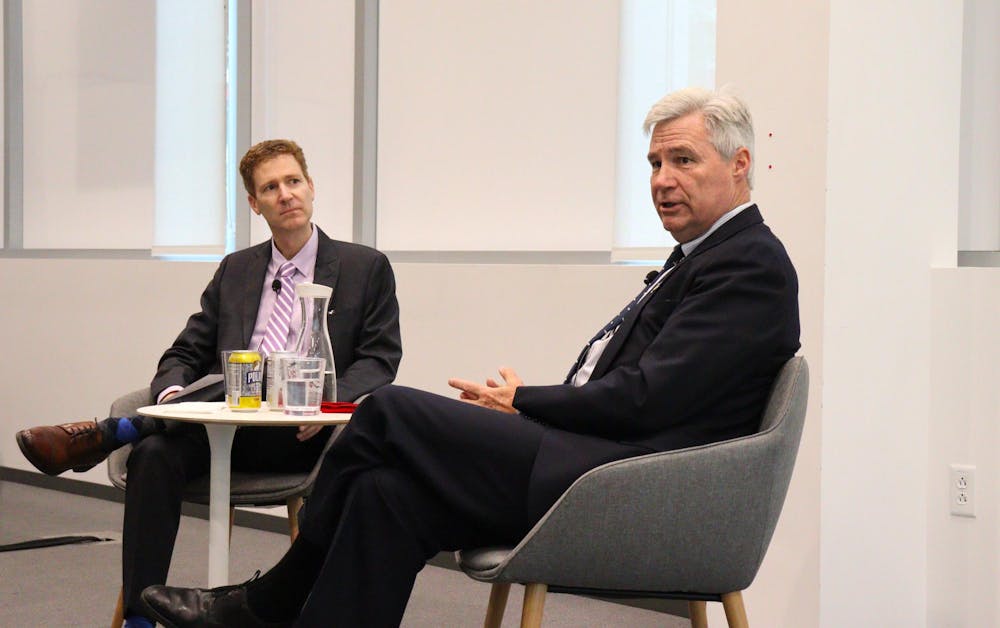Senator Sheldon Whitehouse (D-RI) discussed the 50th anniversary of the 1973 oil crisis and the current need for climate legislation at an event held at the Watson Institute for International and Public Affairs Friday. The event was moderated by Professor of Political Science and Director of the Climate Solutions Lab Jeff Colgan.
The 1973 Oil Shock occurred when the U.S. provided the Israeli government with $2.2 billion in emergency aid for the Yom Kippur War, Colgan explained. The Organization of Arab Petroleum Exporting Countries then issued an oil embargo, refusing to sell oil to the U.S.
“One in five gas stations in the country had no fuel to sell whatsoever,” Colgan said. “By January 1974, oil prices worldwide had quadrupled, and that led to a whole bunch of economic and political consequences” that are still present today.
When asked what it was like living through the oil crisis, Whitehouse shared that there were odd and even days to get gas, decided based on the last number of each person’s license plate. For example, if your license plate ended with a seven and it was an odd day, you could get gas, but if it ended with a six and was an odd day, you could not.
Whitehouse outlined the dilemma faced by oil companies at this time: “Do you keep your prices level because you have an obligation to your country and your customers, or do you follow the international cartel and take advantage of its price gouging?”
“Of course, they chose the latter,” Whitehouse said, explaining that oil companies chose to take advantage of their customers, rather than make gas affordable.
The discussion then shifted into a conversation about modern-day political polarization, particularly surrounding climate legislation. Whitehouse now chairs the U.S. Senate Committee on the Budget, giving him the power to influence funding for climate change legislation, an issue that has been at the forefront of his platform for many years.
Colgan asked Whitehouse why so much of the spending from 2022’s Inflation Reduction Act — federal legislation that subsidizes the development of renewable energy sources and other forms of climate adaptation — goes to red states.
“The logic is that a lot of spending is happening in areas with a strong manufacturing sector,” Whitehouse answered.
He described the difficulties of globalization as more manufacturing jobs went abroad. “What we got back from that was lower consumer prices, but a lot of resentment grew in (former manufacturing centers) about what had happened.”
“To me, it’s good that manufacturing is resuming in places where manufacturing had a base,” Whitehouse said. “The workforce is there, the facilities are often there, and frankly, the people who got left behind were treated very unfairly.”
During the question-and-answer portion of the event, Whitehouse discussed the grave impact of climate change on coastal communities and the effect that will have on the entire country’s economy.
As hurricanes become more severe and homes become damaged more frequently, many insurance agencies are refusing to insure homes in coastal communities, he explained. As a result, people are unable to get mortgages and cannot buy homes in coastal communities, which stops individuals in these areas from moving. The crisis is “ruining people’s lives,” Whitehouse said, and it only emphasizes the need for climate legislation.
Despite the heaviness of the topics discussed at the event, Whitehouse concluded his conversation on a positive note: “The burden of citizenship is not easy. … But we’ll do alright.”
Michael Citarella ’27 said that he went to the event to gain a better understanding of the energy crisis: “I have never been (as) invested in the energy crisis as I should have been.”
“I was impressed with his answers,” said McConnell Bristol ’26, another event attendee. “The overall tone was a bit pessimistic, but I loved the message at the end about how we can do this, and that filled me with hope and excitement about the future.”

Talia LeVine is a section editor covering arts and culture. They study Political Science and Visual Art with a focus on photography. In their free time, they can be found drinking copious amounts of coffee.





